Related Research Articles
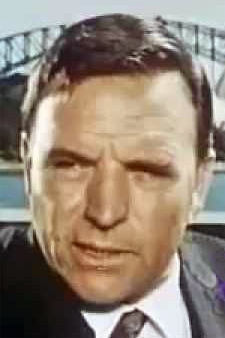
Edward Sidney Devereaux, better known professionally as Ed Devereaux, was an Australian actor, director, and scriptwriter who lived in the United Kingdom for many years. He was best known for playing the part of Matt Hammond the head ranger in the Australian television series Skippy the Bush Kangaroo. He was also involved in the series behind the scenes, Devereaux writing the script and directing the episode The Veteran (1969), for which he received much critical acclaim. Devereaux based the story of the episode "Double Trouble" on an idea conceived by his children, wrote the screenplay of "Summer Storm" and the script for "The Mine". He also played the part of Joe in the Australian 1966 film They’re a Weird Mob. The film was a local success.

Gordon Cameron Jackson, was a Scottish actor best remembered for his roles as the butler Angus Hudson in Upstairs, Downstairs and as George Cowley, the head of CI5, in The Professionals. He also portrayed Capt Jimmy Cairns in Tunes of Glory, and Flt. Lt. Andrew MacDonald, "Intelligence", in The Great Escape.

Murray Hamilton was an American stage, screen and television character actor who appeared in such films as Anatomy of a Murder, The Hustler, The Graduate, Jaws and The Amityville Horror.

Claude Aubrey Akins was a character actor with a long career on stage, screen, and television. He played Sonny Pruit in Movin' On, a 1974–1976 American drama series about a trucking team, Sheriff Lobo on the 1979–1981 television series, among a variety of other roles.
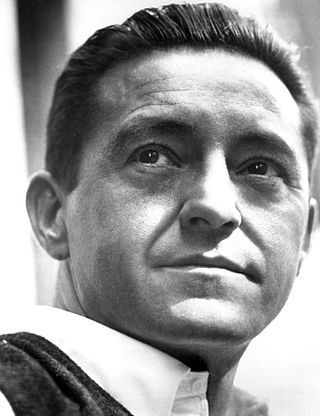
Edward Binns was an American actor. He had a wide-spanning career in film and television, often portraying competent, hard working and purposeful characters in his various roles. He is best known for his work in such acclaimed films as 12 Angry Men (1957), North by Northwest (1959), Judgment at Nuremberg (1961), Fail Safe (1964), The Americanization of Emily (1964), Patton (1970) and The Verdict (1982).

Peter Whitney was an American actor in film and television. Tall and heavyset, he played brutish villains in many Hollywood films in the 1940s and 1950s.
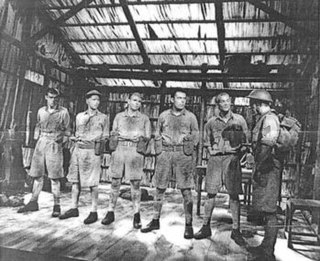
The Long and the Short and the Tall is a play written by British playwright Willis Hall. Set in the Second World War, the play premiered at the Royal Court Theatre in London in January 1959; it was directed by Lindsay Anderson and starred Peter O'Toole and Robert Shaw. It was Anderson's first major production for the Royal Court, transferring to London's West End in April 1959.
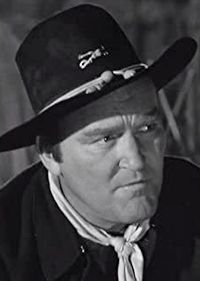
Lane Bradford was an American actor. He appeared in more than 250 films and television series between 1940 and 1973, specializing in supporting "tough-guy" roles predominantly in Westerns but also in more contemporary crime dramas such as Dragnet, The Fugitive, and Hawaii Five-O.
1959 in Australian television was the fourth year of television broadcasts in Australia.

Boy Round the Corner is an Australian film which aired in 1962. Broadcast live on ABC, it was set in Sydney but produced in Melbourne. Australian TV drama was relatively rare at the time.

The battle of Buna–Gona was part of the New Guinea campaign in the Pacific theatre during World War II. It followed the conclusion of the Kokoda Track campaign and lasted from 16 November 1942 until 22 January 1943. The battle was fought by Australian and United States forces against the Japanese beachheads at Buna, Sanananda and Gona. From these, the Japanese had launched an overland attack on Port Moresby. In light of developments in the Solomon Islands campaign, Japanese forces approaching Port Moresby were ordered to withdraw to and secure these bases on the northern coast. Australian forces maintained contact as the Japanese conducted a well-ordered rearguard action. The Allied objective was to eject the Japanese forces from these positions and deny them their further use. The Japanese forces were skillful, well prepared and resolute in their defence. They had developed a strong network of well-concealed defences.

The Sergeant from Burralee is an Australian television play written by Phillip Grenville Mann. The play was also broadcast by the BBC and screened for West German television.
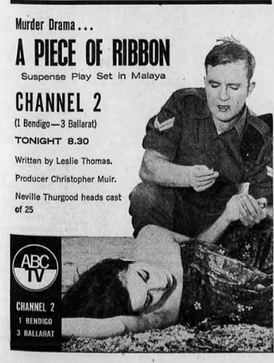
A Piece of Ribbon is a 1963 Australian television play filmed. It was based on an English TV play by Leslie Thomas that had already been performed by the BBC.
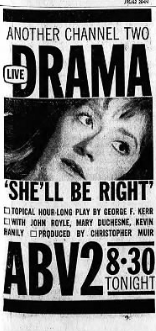
She'll Be Right is a 1962 Australian television play which aired on the ABC.
Christopher Muir was an Australian director and producer, notable for his work in TV in the 1950s and 1960s. In the 1980s he was head of ABC Television drama.
Marriage Lines is a 1962 Australian television play directed by Christopher Muir.
The First Joanna is a 1943 play by Dorothy Blewett that was adapted for radio and television.

The Teeth of the Wind is a 1962 television play broadcast by the Australian Broadcasting Corporation. It was written by John Cameron who had written Outpost (1959) which had screened on American television.
Theirs is the Glory is a 1945 Australian radio series by James J. Donnelly about the Australian army's campaign in New Guinea in World War Two. It was one of ABC radio's biggest productions of the year.
References
- ↑ Men at Play: Masculinities in Australian Theatre Since the 1950s by Jonathan Bollen, Bruce Parr, Adrian Kiernander Rodopi, 2008 p98
- ↑ Vagg, Stephen (16 April 2021). "Forgotten Australian TV Plays: Outpost". Filmink.
- ↑ Remembering masculinities in the theatre of war Bollen, Jonathan. Australasian Drama Studies; St. Lucia Iss. 46, (Apr 2005): 3-0_3
- ↑ "Jungle Outpost". Sydney Morning Herald. 7 December 1959. p. 7.
- 1 2 3 "ABC Dramas". The Age. 1 June 1961. p. 12.
- 1 2 "The Prop Man Wrote a Play". TV Times. 10 December 1959. p. 5.
- ↑ "Identity of Author of TV play a surprise for the ABC". The Age. 10 September 1959. p. 15.
- ↑ "From comic opera to tense jungle drama". The Age. 22 October 1959.
- ↑ "Kunai Grass for Jungle Drama". The Age. 12 November 1959. p. 13.
- ↑ "Live Play on ABC", Sydney Morning Herald, 10 December 1959 p 17
- ↑ TV: A Situation Series: Wayne and Shuster Are Seen in 'Holiday Lodge,' Replacement for Jack Benny By JACK GOULD. New York Times 26 June 1961: 51.